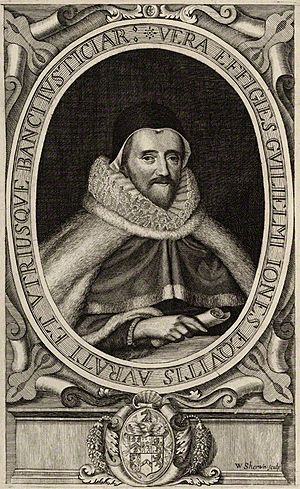William Jones (judge) facts for kids
Sir William Jones (1566–1640) was an important Welsh judge. He also served as a Member of Parliament (MP) for Beaumaris, representing the people in government.
Contents
Life of a Judge and Politician
Sir William Jones came from a family in North Wales. He was the oldest son of William Jones of Castellmarch. His mother was Margaret, daughter of Humphry Wynn ap Meredith.
Early Education and Law Career
William first went to Beaumaris free school. When he was fourteen, he attended St. Edmund's Hall, Oxford, but he did not finish his degree there.
Five years later, he began studying law at Furnival's Inn. He then joined Lincoln's Inn in 1587 and became a lawyer in 1595. In 1616, he became a "Lent reader" at Lincoln's Inn, which was an important teaching role.
Becoming a Judge
In 1617, William Jones became a "serjeant-at-law," a very senior type of lawyer. He was also knighted, earning the title "Sir." Soon after, he was appointed Lord Chief Justice of the King's Bench for Ireland. This meant he was the top judge in Ireland for certain types of cases.
While the main legal leader in Ireland was away, Sir William also helped manage the "great seal," which was used to make official documents legal.
Serving in Parliament
Besides his work as a judge, Sir William Jones was also a Member of Parliament (MP). He represented the town of Beaumaris three times: in 1597, 1604, and 1614. He also represented Caernarvonshire in 1601. As an MP, he helped make laws and represent his area in the government.
Return to England and Later Career
In 1620, Sir William left his judge position in Ireland and returned to work as a lawyer in England. His name appears in legal reports from that time.
In 1621, he was appointed a judge of the Court of Common Pleas. This court handled disagreements between people. He also served on a special group that went to Ireland to look into legal matters.
Later, in 1624, he moved to the Court of King's Bench. This court dealt with more serious legal cases.
Important Cases and Decisions
As a judge in the Star Chamber, a special court, Sir William often favored being less strict in his judgments. However, in 1627, he was one of the judges who did not allow some important figures, like Sir John Eliot, to be released from prison on bail.
In 1630, he was one of the judges who heard the cases of Eliot, Denzil Holles, and Benjamin Valentine. He delivered the court's final decision in these cases.
Later, in 1636, he supported the idea of "ship money." This was a tax that the king wanted to collect from everyone, even those living far from the coast, to pay for the navy. In 1638, he ruled that this tax was legal.
Sir William Jones passed away in his home in London on December 9, 1640. He was buried in Lincoln's Inn Chapel.
His Writings
Sir William Jones was also interested in history. He wrote a paper about the early Britons, which was read to the Society of Antiquaries. People at the time thought he was very knowledgeable about old British history.
His own legal notes, called "Reports of Cases," were published in 1675. These books recorded important court decisions from his time as a judge.
Family Life
Sir William Jones married Margaret in 1587. She was the oldest daughter of Griffith ap John Griffith. After her death, he married Catherine, who was the widow of Dr. Robert Hovenden.
Two of his sons, Charles and William, also became MPs, following in their father's footsteps.
 | Calvin Brent |
 | Walter T. Bailey |
 | Martha Cassell Thompson |
 | Alberta Jeannette Cassell |


